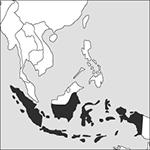
Source: MAPS IN MINUTES™ © RH Publications (1997)
Capital:
Jakarta
Area:
1,904,569 sq km (735,358 sq miles)
Population:
251,160,124 (2013 est)
Currency:
1 Indonesian rupiah = 100 sen
Religions:
Muslim 86.1%; Protestant 5.7%; Roman Catholic 3.0%; Hindu 1.8%
Ethnic Groups:
Javanese 40.6%; Sundanese 15.0%; Madurese 3.3%; minority groups
Languages:
Bahasa Indonesian (official); English; Dutch; Javanese, Sundanese, and many other local languages
International Organizations:
UN; ASEAN; Non-Aligned Movement; Colombo Plan; WTO
A country composed of hundreds of tropical islands in south-east Asia, in the region where the Pacific and the Indian Oceans meet.
Physical
Its east-west length is greater than the width of Australia or the USA, for among its larger islands are included parts of New Guinea (Irian Jaya) and Borneo (Kalimantan) and all of Sumatra, Java, and Sulawesi (once Celebes). Among its smaller islands are Bali, Timor, Flores, and the Moluccas. This vast area lies at the edge of the Eurasian plate. It contains over 70 volcanoes, some periodically active like Krakatoa; and it is subject to severe earthquakes. While many of the beaches are black with volcanic mud, others are coral, with very clear water.
Economy
The principal exports are oil, natural gas, electrical goods, plywood, textiles, and rubber. Over one-third of the population work in agriculture, important products being rubber, palm oil, poultry, and beef. Industries include oil, natural gas, textiles, and vehicles.
History
The Hindu Srivijaya Empire, based on Palembang, flourished between the 7th and 13th centuries ad. Towards the end of the 12th century the Majapahit kingdom, which was based on Java began to dominate the area of present-day Indonesia. During the 16th century the area was occupied by the Portuguese, the British, and the Dutch. The Dutch East India Company had acquired control of most of the islands of Indonesia by the end of the 17th century, with headquarters in present-day Jakarta (then Batavia).
The islands were formed into the Netherlands-Indies in 1914. By the 1920s, indigenous political movements were demanding complete independence. Prominent here was Sukarno’s Indonesian Nationalist Party (Partai Nasionalis Indonesia), banned by the Dutch in the 1930s. The Japanese occupation of 1942–45 strengthened nationalist sentiments, and, taking advantage of the Japanese defeat in 1945, Sukarno proclaimed Indonesian independence and set up a republican government. Dutch attempts to reassert control were met with popular opposition (the Indonesian Revolution), which resulted in the transfer of power in 1949. By 1957 parliamentary democracy had given way to the semi-dictatorship or ‘Guided Democracy’ of President Sukarno, a regime based on the original 1945 constitution, with a strong executive and special powers reserved for the army and bureaucracy. Sukarno’s popularity began to wane after 1963, with the army and right-wing Muslim landlords becoming increasingly concerned about the influence of communists in government. Rampant inflation and peasant unrest brought the country to the brink of collapse in 1965–66 when the army under General Suharto (1921–2008) took advantage of a bungled coup by leftist officers to carry out a bloody purge of the Communist Party (PKI) and depose Sukarno (1967). Despite his initial success in rebuilding the economy and restoring credit with its Western capitalist backers, Suharto’s regime remained authoritarian and repressive, moving ruthlessly against domestic political opponents. In 1976 Indonesia annexed the former Portuguese colony of East Timor (see timor-leste), causing thousands of civilian deaths. The United Nations (UN) disputed the action and conflict between the independence movement and government forces in East Timor continued. In 1999 a referendum, organized by the UN, showed overwhelming support for independence. Local militias then embarked on a campaign to kill the leading supporters of independence and thousands of people fled. A UN peacekeeping force was sent in and East Timor finally became independent, as Timor-Leste, in 2002. Conflict also erupted in the province of Irian Jaya, part of the island of New Guinea, where a rebellion was staged in support of unification with Papua New Guinea. New border arrangements agreed between the two countries put a stop to fighting in 1979, but conflict broke out again in 1984, causing many refugees to flee from Irian Jaya to Papua New Guinea. Accords were signed by Indonesia and Papua New Guinea over security and trade issues in 1992, but further clashes between government troops and separatist rebels occurred in 1993. There was growing demand for greater democracy in Indonesia in the early 1990s. While Suharto appeared to accept these demands, the activities of new pro-democracy organizations were met with government repression. In 1990–91 a separatist rebellion in the province of Aceh (Sumatra) was crushed. The arrest of pro-democracy campaigners in 1996 resulted in demonstrations and civil unrest. In 1997 the country faced an economic crisis with the collapse of the rupiah, which led to food riots and civil disorder. The International Monetary Fund provided a financial rescue package. Suharto was elected for a seventh term of office in 1998 but resigned in favour of his deputy, B. J. Habibie, following mass protests and rioting. In 1999 Indonesia’s first free elections for 45 years were won by the opposition Democratic Party. Abdurrahman Wahid became President later the same year, but in 2001 was impeached for corruption and succeeded by the Vice-President, Megawati Sukarnoputri. In 2004 Sukarnoputri was defeated in Indonesia’s first direct presidential elections by Susilo Bambang Yudhoyono. At the end of that year, the Indian Ocean tsunami killed over 160,000 people in Indonesia, mainly in northern Sumatra. Joko Widodo was elected President in 2014 and promised major reforms. However, economic growth has remained disappointing and the problem of rising Islamic militancy remains unresolved.
- phylogram
- phylozone
- phylum
- -phyre
- physical
- physical address
- physical albedo
- physical capital
- physical chemistry
- physical double
- physical explosion
- physical geography
- physicalism
- physical layer
- physical libration
- physical map((in genetics))
- physical medium
- physical quality of life index
- physical units
- physician-assisted suicide
- physico-theological argument
- physico-theology
- Dolgellian
- doline
- dollar